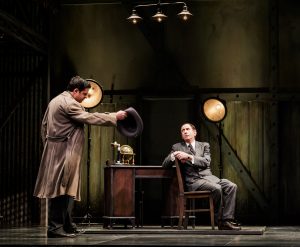Too Much Muck Makes Movies Self-Censor in LJP ‘Hollywood”
Hollywood, a new Joe DiPietro play now at the La Jolla Playhouse, wallows in the boom-town muck of silent-movie scandal while making some shrewd observations about the nature of that revolutionary beast as it was taking over the popular imagination.
In fact, one character in the play, a studio boss, offers as clever and succinct a summation of the whole pop movie ethos as I can remember. I’ll quote him as closely as the Internet allows:
“Do you know what makes someone a movie star? They have that special something that makes the people back home want to f**k them. That’s our little secret, that’s all we really do – create people that other people want to f**k.”
See what I had to do there? Even though everybody knows exactly what the missing letters are, I still have to dance the dance or the Internet gods will filter me away from you. Or something. It’s the same old boring, tired dance of censorship.
This Hollywood play is about the early versions of that choreography, with higher stakes since each state in the union had to power to trim objectionable scenes out of motion pictures and charge producers for doing so. Bluenoses of every hue might have bankrupted the infant industry if it hadn’t fought back with the clever tactic of hiring its own censor, a politician from Warren Harding’s cabinet who was well-tuned to the nuances of hypocrisy and tightly connected in useful political circles.
Will Hays built and enforced “The Code,” which decreed that every crime must be punished, every religionist respected and even married couples must sleep alone, among other such flapdoodle, a set of rules which were both piously supported and merrily violated by moviemakers. The Hays Office wheezed and rattled, but for three decades or so it kept the scolds at bay while the profits soared.
A Hays sideline was moral turpitude. The stars who got caught being naughty were nudged out of the business as unfit for the innocent eyes of the ticket-buying masses. Of course, those bad boys often were even more fascinating to the rubes than the pure or the funny or the tragic, as proven by the parallel business of fan worship. That’s still with us today at the supermarket counter and in the digital sewers, where scavengers cavort, free from facts, through the dark parks of voyeurism.
To illustrate his cautionary cynicism, DiPietro borrows from Hollywood’s potent mythology an old but sturdy murder mystery, the more distinguished because it never has been solved: The shooting of director William Desmond Taylor in 1922.
Since all the original principals in this drama are long gone, the author can use everybody’s real name and make of them what he will. Anyway, they’re mostly forgotten and time has moved them beyond the range of libel laws.
Taylor directed 60 silent films between World War I and his death, starring such big names of the period as Mary Pickford, Wallace Reid and his girlish protégé, Mary Miles Minter. The 49-year-old director’s body was discovered by his butler early one morning and chaos ensued, with studio representatives, newspaper reporters and suspects milling around the crime scene and destroying evidence. Suspicion swept across neighbors, employees and colleagues but eventually engulfed in turn Minter, her domineering mother and Mabel Normand, a major comedy star with an infamous cocaine habit.
To this very day there still are bands of aficionados who pursue details of this affair. The landmark film “Sunset Boulevard,” Gore Vidal’s 1990 novel “Hollywood” and the Broadway musical “Mack and Mabel” all deal with the story. By the end of 1922, according to the L.A. Police, over 300 people had confessed to the crime.
It’s DiPietro who has solidified the obvious connection between this murder and the rise of the Hays office. In fact, Hays serves as the host of this fragmented dream-drama, absorbing scorn with hayseed placidity while tightening the censor’s noose. He even prods the L.A. District Attorney toward the appropriate path. And the contrast between his bland sanctimony and the rancid slush of crooked cops, media jackals, reckless sex, illegal booze and blocked realities is vivid if not indelible.
There is, after all, nothing unique about these sins. These and worst have abounded through history. But DiPietro has cleared an interesting niche for speculation about the uses of delusion in a story of the showmen’s struggles to maintain the fantasies just balanced enough between reality and illusion to keep the customers satisfied.
Director Christopher Ashley follows his author along the obvious paths of dream-like abstraction to make room for the messages. Perhaps he pauses too long here and there – the studio boss pounds out his frustrations on a punching bag just a bit too long and Miss Minter’s Kewpie-Doll voice begins to wear – but the miasma sticks and the points multiply smoothly.
Ashley is helped by another of those multi-level, all-purpose sets which so distinguish LJP work, this one a dark and textured movie lot by Wilson Chin, superbly lit by Howell Binkley and much enhanced by the silent-film flashes and the relentless screaming headlines of Tara Knight’s projections.
Any dullness in the costumes should be blamed on the period; Paul Tazewell is an accurate researcher and realizer. The same can be said by pianist Wayne Barker, who pounds away onstage as needed and who contributed a nice wistful ballad for some of the dreamier moments.
Scott Drummond has the poise and the slightly overcooked good looks of the era as Taylor and, fortunately, he’s a plausible ghost. Talene Monahon deftly pivots between simpering ingénue and crazed juvenile as Minter, rasping away in that cartoon voice, but Kate Rockwell as Normand seems too vague and distracted ever to have been leading lady for Charlie Chaplin and Fatty Arbuckle.
While Ashley ushers his remaining actors through dozens of roles with confident aplomb, top honors fall to Patrick Kerr, whose Will Hays is a dead ringer for old photographs, in a crafty invocation of the classic American stage character, the wise bumpkin. Kerr seems to float along the river of sewage until the precise moments when he must pull the drain plug, which he does with a steely purpose that suggests exactly how commerce would elbow past art for the next few decades.
ContinuesTuesdays-Sundays until June 12, 2016.

Welton Jones has been following entertainment and the arts around for years, writing about them. Thirty-five of those years were spent at the UNION-TRIBUNE, the last decade was with SANDIEGO.COM.




